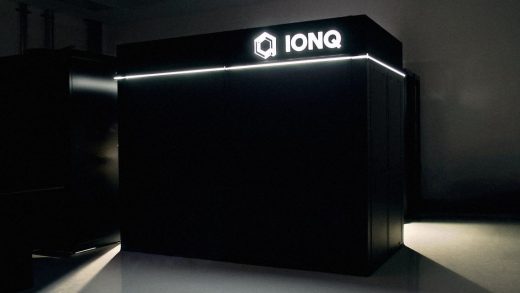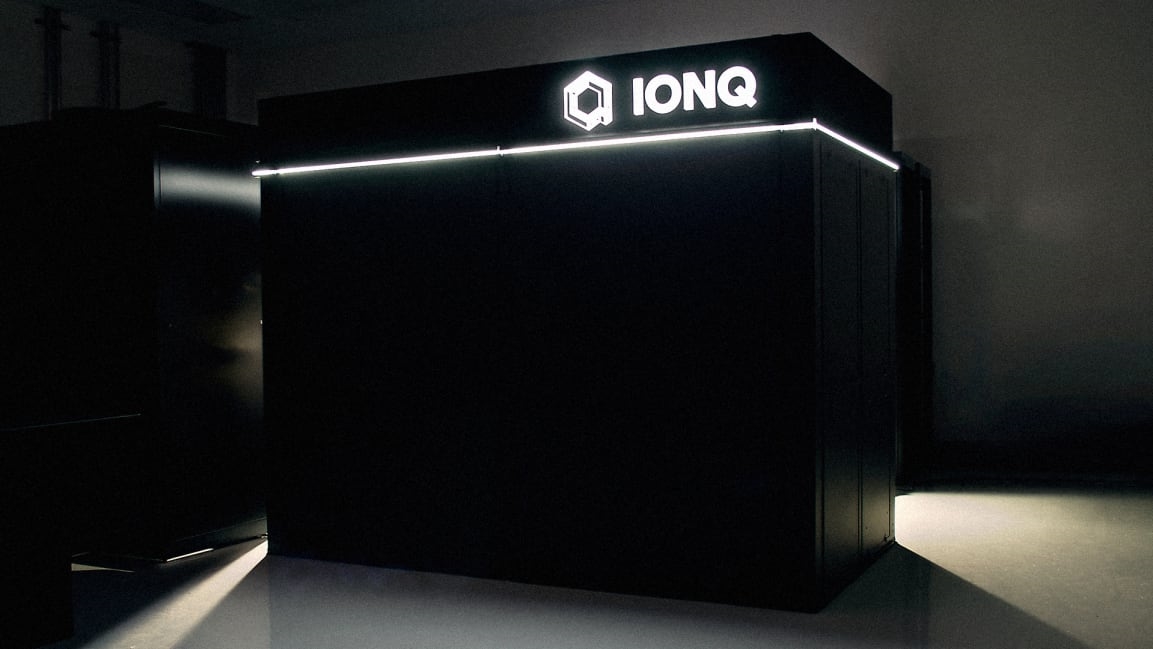How IonQ is planning to bring a quantum computer to the masses
Today, Maryland-based quantum computing company IonQ is going public via a SPAC in a deal that’s expected to raise $650 million. Its $2 billion valuation and big-name investors indicate that quantum computing may be helpful to businesses sooner than expected.
The company’s main product is a 22-qubit quantum computer, to which it sells access through the Amazon AWS, Microsoft Azure, and Google Cloud. Qubits are the far more versatile analogs of the binary bits used in classical computers.
IonQ says its hardware is based on 25 years of research by Chris Monroe and Jungsang Kim, professors at Maryland and Duke universities, respectively. The two licensed their research from the universities and founded a company based on it in 2015, with the stated goal of bringing quantum computing out of the lab and into businesses.
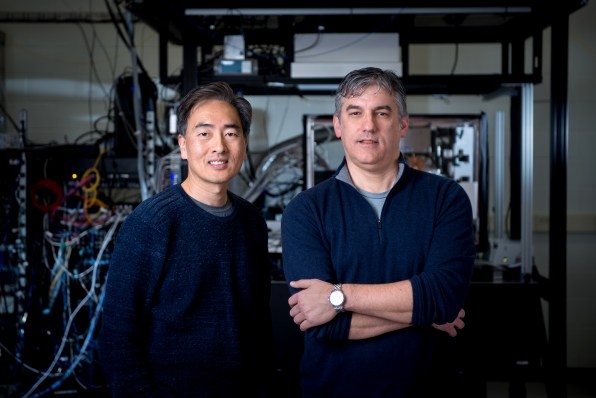
[Photo: IonQ]
Many in the tech industry hope that quantum computers will deliver the next big leaps forward in compute power now that prying incremental gains from traditional silicon chips has grown progressively harder. While chip makers try to squeeze more transistors onto silicon for ever-smaller capacity increases, quantum proponents say adding a single qubit to a quantum machine can double its power.
But quantum computing remains a nascent technology; most experts don’t expect it to outperform today’s supercomputers for at least another five years. So it’s natural to wonder how IonQ is making money now, and why new investors should have confidence that the company’s earnings will keep growing after Friday’s IPO.
IonQ CEO Peter Chapman tells me that anybody can access IonQ’s 22-qubit quantum computers today. “You can use those devices, they’re relatively cheap, for two bucks you can run your quantum version of Hello World,” he says, referencing a short program developers use to test out new programming languages. IonQ doesn’t disclose its revenues, but has said publicly that it’s “eight figures,” with a run rate in the tens of millions per year.
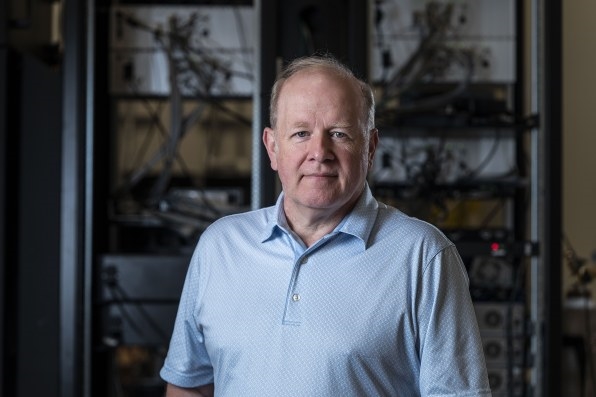
[Photo: IonQ]
“There’s a very high probability that quantum is going to be an industry that’s worth hundreds of billions of dollars in market cap because it’s going to power the future of the cloud,” said Niccolo de Masi, the CEO of the SPAC taking IonQ public, in a September 24 interview. “IonQ wouldn’t have Amazon as a shareholder and Google as a shareholder if it weren’t important to the trillions of dollars of market cap each of these companies have.”
Most people in the industry believe that quantum computers will need to grow to roughly 1000 qubits to become competitive with the classical supercomputer service delivered through the cloud today.
IonQ will deliver such a system “within roughly two years, maybe three,” Chapman tells me. “And that’s substantially sooner than most people think.” Chapman came to IonQ from Amazon, where he directed the engineering group behind Amazon Prime.
IonQ expects to release a new chip in 2023 that contains 64 qubits. The company believes it can upgrade that same chip design to contain “two or three hundred” qubits. And that system will be modular, Chapman says; the quantum chips will be contained in rack-mount boxes that have optical connections so that it’s possible to string several of the machines together, combining their power.
“Let’s say that we manage to get 256 qubits onto a single chip, then our next goal is to build four systems and then network them together and that gets you to the 1024 that you need,” Chapman says. “We’ve got it working in the lab; now what we’re doing is productizing it to get it working on the chip.”
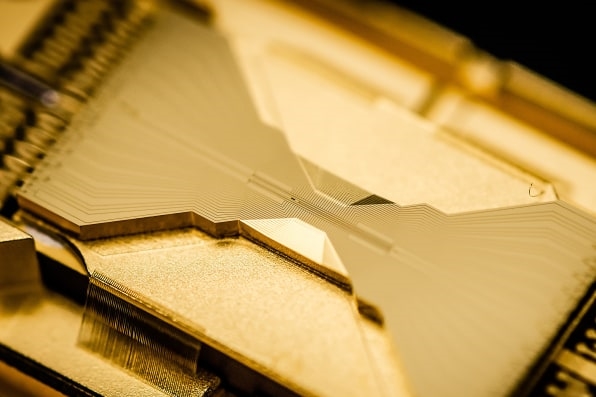
The biggest technical barrier to quantum computers becoming truly useful is the instability of qubits. They’re temperamental little things that don’t maintain a “coherent” state—which means they won’t hold still for very long. So for every one qubit that’s stable enough to be used in a mathematical equation, many more must be standing by for error correction. How many depends on the materials and design used in the quantum chip.
IonQ’s secret sauce is in the type of qubits it uses and how it places them on a chip. Chapman says many of the quantum computers in development today use synthetic qubits that are mounted on silicon and connected and controlled with wires. Because qubits don’t like to be touched, those factors open the door to instability and errors. IonQ’s qubits are charged ions taken from the atomic isotopes of a rare earth metal called ytterbium. The ion qubits float in an electromagnetic field within an airtight “trap” and are controlled using photons. Chapman says these factors contribute to greater stability and fewer errors.
Even though quantum computers aren’t yet fast enough to take over for classical supercomputers, there are good reasons for some companies to buy into the technology early.
Financial institutions will be among the first businesses to benefit. Many of them are already setting up quantum research departments and working on algorithms that exploit quantum computing. The financial institution Fidelity is using IonQ to create quantum algorithms that ingest lots of historical financial data to determine the chances of a borrower defaulting on a loan. Goldman Sachs is developing algorithms to determine how the movement of one stock’s price is affected by the movement of another. Right now, Goldman’s algorithm can only analyze two stocks at a time, but, with more compute power, the algorithm will grow to analyze the hidden nuances of the price interactions of thousands of stocks. These algorithms could one day underpin entire business models, so the companies developing them have a real interest in getting them patented early.
This helps explain why IonQ is going public now, as opposed to two or three years from now when it expects to be able to offer 1000-qubit computing. Chapman says IonQ needs the IPO proceeds to accelerate development of its future 64-qubit chip, and since the company plans to build a rack-mount box around that chip and sell them, it expects to begin incurring contract manufacturing costs as well. “SPAC allowed us access to capital to accelerate our growth faster than a traditional IPO,” Chapman says.
Quantum computing’s value proposition still contains some big if’s. We may learn a lot about the investing public’s confidence that quantum’s considerable barriers can be overcome by watching the value of “IONQ” after it opens on the NYSE Friday.
(58)

